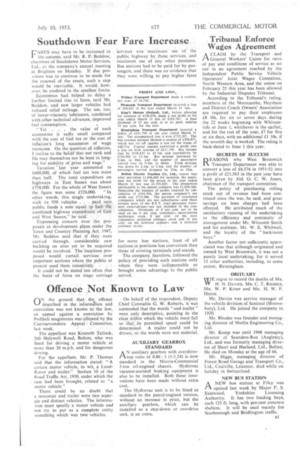Southdown Fear Fare Increase
Page 27

If you've noticed an error in this article please click here to report it so we can fix it.
FARES may have to be increased in the autumn, said Mr. R.• P. Beddow, chairman of Southdown Motor Services, Ltd., at the company's annual meeting at Brighton on Monday. If due provision was to continue to be made for the renewal of the assets, such a step would be inevitable. It would, how ever, be confined to the smallest limits.
Economies had. helped to delay a further limited rise in fares, said Mr. Beddow, and new larger vehicles had reduced relief mileage. The use, too; of lower-viscosity lubricants, combined with other technical advances, improved fuel consumption.
"Yet . • . the value of such economies is sadly small compared with the cost of fuel tax or the cost of inflation's long succession of wage increases. On the question of inflation, 1 incline to the belief that our rank and file may themselves not be least in longing for stability of price and wage."
Taxation last year amounted to £600,000, of which fuel tax was more than half. The total expenditure on highways in -East Sussex was about £758,000. For the whole of West Sussex
the figure was some £526,000. "In other words, this single undertaking, with its 950 vehicles . . . paid into public funds a sum equal to halt the combined highway expenditure of Eakt and West Sussex," he said. : •
Expressing concern over the proposals in development plans .under the Town and Country Planning Act, .1947, Mr. Beddow said that if they were carried through, considerable new building on sites yet to be acquired would be involved. The locations proposed would curtail services over important sections where the public at
present used them intensively. , It could not be stated too often that the basis' of fares on stage carriage services was 'maximum use of the public highway by those services, and minimum use of any other premises. Bus stations had to be paid for by passengers, and there was no evidence that they were willing to pay higher fares for more bus stations, least of all stations in positions less convenient than those of existing terminals and stands.
The company, therefore, followed the policy of providing such stations only where they were indispensable or brought some advantage 'to the public served.












































































